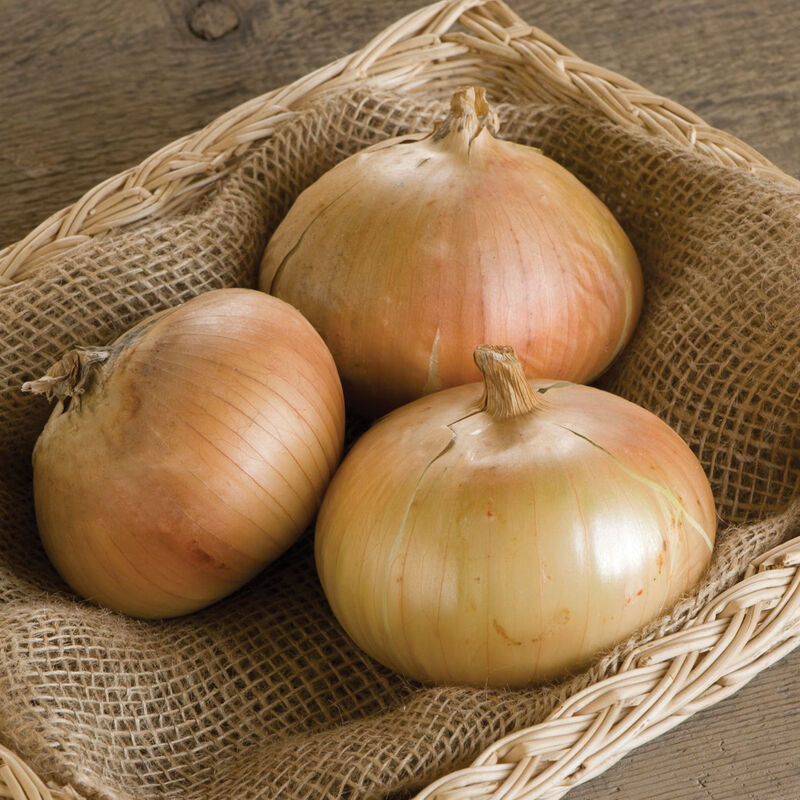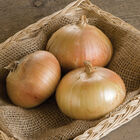Bridger Pelleted (F1) Onion Seed
Bridger Pelleted (F1) Onion Seed
The best onion for overwintering in the North. Conventional seed with NOP-compliant pelleting.
Large, flattened globe bulbs can be harvested in August from spring sowings for short-term storage. In areas with normal low winter temperatures above -10°F (-23°C), seeds sown in August can be harvested early the next summer. In colder areas, it can be planted in the fall and covered with row cover and Quick Hoops™. Adaptation: 35–50° latitude.Specs:
- This product does not ship to the following countries: United Arab Emirates, Austria, Australia, Barbados, Belgium, Bulgaria, Bermuda, Bahamas, Switzerland, Cyprus, Czech Republic, Germany, Denmark, Estonia, Spain, Finland, France, United Kingdom, Greece, Hong Kong, Croatia, Hungary, Ireland, Iceland, Italy, Japan, Republic of Korea, Kuwait, Cayman Islands, Lithuania, Luxembourg, Latvia, Malta, Netherlands, Norway, New Zealand, Oman, Poland, Portugal, Qatar, Romania, Saudi Arabia, Sweden, Singapore, Slovenia, Slovakia, San Marino, Thailand, Trinidad and Tobago, Taiwan, Ukraine.
SCIENTIFIC NAME:
Allium cepaCULTURE:
Reduce time-consuming thinning and increase planting uniformity by seeding pelleted onions with a precision seeder. Our onion seeds are pelleted with inert NOP-compliant materials. These pellets are size 13.0, are ideal for direct sowing, and can be planted with Stanhay seeders (belt size 13.0) or any of the precision seeders offered by Johnny's. For best results, we recommend consistent soil moisture during the germination period. Pelleted seed must be kept cool and dry prior to planting, and should be used within one year of purchase. Onions require full sun and fertile, well-drained soil with a pH of 6.0-7.0. Sandy loam soils are ideal; raised beds or raised rows are recommended for heavier soils to promote soil drainage.DAY LENGTH:
Onion bulbing is triggered by day length, and maximum day length during the growing season increases from south to north. Short-day onions are grown at lower latitudes in the South, while intermediate and long-day onions are grown at higher latitudes. Refer to "Adaptation" in each variety description for details.DIRECT SEEDING:
In April or early May, or as soon as the soil can be prepared in early spring, sow in a 2" wide band, about 2 seeds/in., 1/4- 1/2" deep, rows 12-18" apart. Thin to 1 1/2-2" apart for highest yields in fertile soil. Thin to 3-4" apart for larger onions.TRANSPLANTING: In long- and intermediate-day areas, sow indoors 6–8 weeks before last frost date. Sow 128-cell trays, 1 seed/cell, and cover with 1/4" soil. Transplant 4" apart in rows 12–18" apart. Unruly tops may be clipped to 5" at time of transplant.CULTIVATION:
Keep onions well weeded with shallow cultivation.WATER:
Onions are shallow rooted and grow best with at least 1" per week of rain or irrigation, especially during the bulbing phase.DISEASES:
Adequate air circulation and crop rotation aids in reducing the risk of foliar disease.HARVEST:
When necks become soft and 50% of tops are falling over, pull and cure in well-ventilated space out of direct sunlight (to prevent greening) or sun-cure in field for 2–7 dry days before moving to dry location. Cure until tops are completely dried; about 2 weeks.STORAGE:
When dry, clip off tops and roots and store in onion bags or shallow boxes at near freezing and 65-70% humidity.DAYS TO MATURITY:
From direct seeding; subtract 10-15 days if transplants are used.AVG. SEEDING RATE:
464,600 seeds/acre @ 16 pellets/ft. ( 3/4" spacing) in rows 18" apart or 16,000 pellets/1,000' row.SEED SPECS:
SEEDS/LB.: Avg. 15,300-17,700 (avg. 16,500).Johnny's is committed to your success, every step of the way.
We want you, our customer, to be 100% satisfied with all of our seeds, tools, and supplies.
If anything you purchase from us proves unsatisfactory, we will either replace the item or refund the purchase price.





